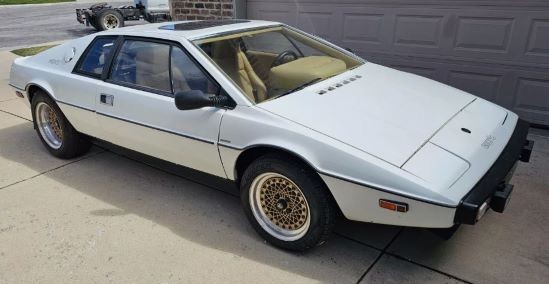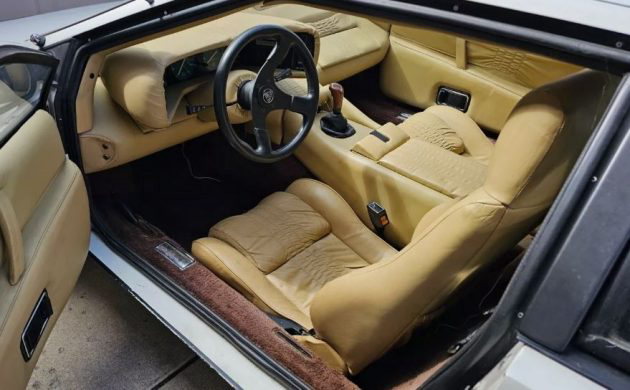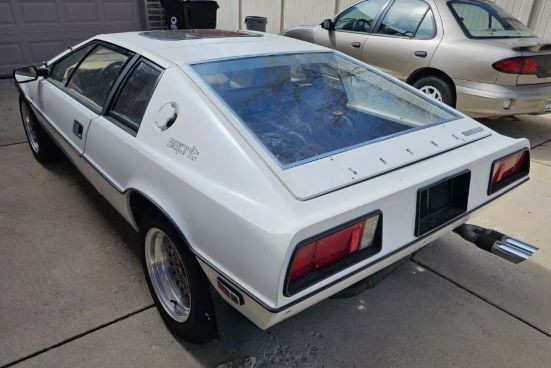Giorgetto Giugiaro went to work at Fiat’s Special Vehicles Division at seventeen – mostly likely younger than many of us were when we purchased our first car. Fiat ignored his design work, so he approached Bertone, who sold one of his ideas to Alfa; the 2000 entered production in 1958. Giugiaro roved among studios until founding Italdesign in 1968. His business flourished, and he was inducted into the Automotive Hall of Fame in 2002. Giugiaro’s creations were forward-looking trendsetters. The Lotus Esprit was one of these, though its gestation was unusually long. Lotus had foisted the Europa into the market in 1966, and while it was stinkin’ fast and handled like a race car, its looks were controversial. To improve the company’s style credentials, Lotus turned to Italy – specifically Giugiaro. The concept for the new Lotus emerged in 1970, but the car itself didn’t hit showrooms until June 1976. The first cars – called the Series 1 – have amassed substantial interest among collectors in the past few years for their purity of form – and that form is the “folded paper” idiom that influenced countless manufacturers in the years to come.
This 1978 Lotus Esprit has seen plenty of work, including a rebuild of its mid-mounted, Type 907 2-liter DOHC four-cylinder engine at some point – but the prior owner’s mechanic neglected to insert a crucial screw in the cylinder head, causing oil leakage at its first start-up. The seller has replaced the timing belt, the carbs have been rebuilt and the plug wires are new; I gather that the missing plug was not discovered until he turned the key. The seller suggests pulling the engine and resealing the Citroen five-speed transmission while you’re at it. These cars develop about 140 hp in US-delivered specification – an anemic result diametrically opposed to its exotic looks. The odometer reads just over 50k miles and shop and owner’s manuals are included in the sale.
The Esprit was unique in its …. unusual interior fabrics and colors. Many Loti were cloaked in velour of contrasting colors – sometimes several colors. This example received leather upholstery with Lotus’ trademark swaggy pleats – all over. The interior has been refurbished in the recent past and shows little wear. The blocky instrument panel buries the green-faced gauges and the gearshift sits high in the console. You don’t so much sit in an Esprit as wear it.
This example is missing its rear valence, though the rear bumper – in poor condition – comes with the car. The seller suggests buying a set of Euro bumpers and the valence from SJ Sportscars. I dislike the sunroof, but it’s tolerable. Rust will attack the backbone chassis, though the worst you’ll find on the fiberglass body is stress cracking unless the car has been in an accident. Series 1 production numbers were limited to 718 copies and not all of those survive today, which helps explain robust price increases over the last few years. Nice examples can cost $65k. This Esprit can be found here on eBay for $20,500 or best offer; it can be retrieved from Salt Lake City, Utah. While it’s a long way from “nice”, if you pine for the pure Esprit experience, a little haggling might land this in your garage at a very reasonable price.






I like the looks of the early cars best. This looks like a great deal for the price!!
I agree. As soon as they rounded the lines, it started to look like many other cars.
I also like the sharper lines of he early models. IIRC, the white ones were also offered with a “submersible” package, depending on the type of license you had.
The spy who loved me!
Having owned a Europa since 1973, I can attest that Lotus owners heads all have a loose screw!
Chapman cars were always an “almost” proposition.
Almost got it right.
The internal oil passages in the front of the cylinder head are drilled, then the open ends are plugged with about 10mm, Allen Drive “BSP grub screws” (ie, plugs). The missing plug is in the front right of the head, on the bottom face. The corner of the block partially overlaps the screw’s bore, so you can neither install nor remove the plug with the head on the block.
It’s not necessary to remove the engine from the car in order to install a plug; however, the cylinder head does have to come off. Once it’s off, the “fix” is a five minute job, and the head goes back on.
I would just remove the head, leaving the rest of the engine in the car (not easy, but possible). But many owners/ mechanics who are not as familiar with the car choose to pull the engine and deal with the “fix” with the engine on the floor. Fine. But I could have the head off, the oil passage plugged, and the head back on the engine in less time than it would take one of those guys to put the engine on the floor. Your choice.
Tim
I too like the looks of the early cars but loved it when they dropped the V8 in them
Pretty sweet. Looks pretty clean for one of these. I’d pop the head, fix the leak and then find out what all else was wrong it.
Started designing cars at 17!!!! Those were the days. My notebooks were full of great sketches. The whole college experience really snuffed me out. And the student debt terrified me at the time!
I don’t understand…. the previous owner had the engine rebuilt, but never attempted to start it? Why would a rebuilt, but never operated, engine need a new timing belt (the age of the belt, and thus the rebuild, perhaps)? I have to believe the previous owner knew. Whether or not he disclosed it is another matter.
The timing belt has a change interval spec in terms of BOTH miles and time… and the time is just as important as the miles. Time can actually be more critical, since sitting static under tension in one position is harder on the belt than normal periodic use. “IF” the car sat idle for a period of time after the engine rebuild, the timing belt could very well have been ready for replacement.
In the rear this Lotus Esprit is missing the rear bumper and the valance panel underneath the bumper that would shield the muffler from view.